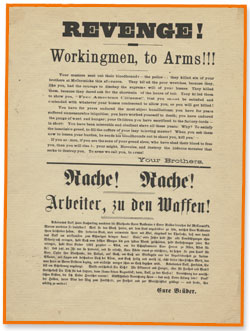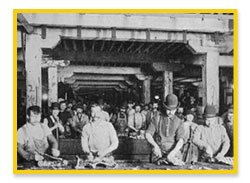His Father's Namesake
High School: Grades 9–12
Story
Page: 1 | 2 | 3 | 4 | 5 | 6 | 7
"But, Peter, I have just got this job. It is my first job in America..."
Peter interrupted Hans. "Listen to me, this is all I know: My family came here to make a better life. When my family left Germany, we left behind a farm that we had lived off of for generations. We planted the grain; we harvested it. After the grain was ground, my grandmother and mother would make bread for us. Looking back now, I see it was a good way to live. What do I do now? I work in a factory owned by rich men. The factory makes a machine that can do more harvesting in one day than five or six men could! Here, listen to this."
The man took a folded piece of paper out of his pocket and began to read from it aloud. At the top it said, "To the Workmen." At the bottom was a picture enclosed in a circle of two hands holding one another's. Around the edge of the circle it said, "Central Labor Union of Chicago."
"Just listen to what this says," Peter began. "'It is in the nature of the case, that the manufacturers desire to procure labor as cheap as possible in order to sell more goods and make higher profits. Therefore they will in the future as well as now do everything to increase the productive ability of the workers to the highest point so that they may benefit thereby.
'As one of the means to this end they have already introduced piecework... It is therefore necessary that we not only demand an eight-hour workday but also endeavor to abolish piecework.'"
Peter folded the paper up and spoke sternly to Hans. "This piecework is what you have been hired to do. You will screw one little part of the harvester to another little part. You will work twelve hours a day doing it. The more pieces in a machine, the more men they need to put the pieces together. The more men working, the less money each worker makes but the more harvesters we build! Who gets rich? Do you? No, the factory owners! Well, the way I am beginning to see it, the more harvesters we build, the less dignity we workers have. I didn't come to America to make somebody else rich. At these meetings they help workers to understand their plight and to organize them. They are helping others to see that by organizing we can be as powerful as these factory owners and their money! If we organize ourselves into a union, we can at least demand an eight-hour workday and maybe even higher wages. These men who own the factories worship the dollar, not God!"
Hans was taken aback at Peter's last statement. He had been nodding through Peter's tirade, but now spoke softly. "But Peter, I just got this job. I have to do this 'piecework' as you call it. I have a baby at home and another on the way. What happens if our protests fail and I lose my job? I know there is another man who would be willing to take my job for the wages I am going to make."
His friend replied, "Yes! That is exactly why we all have to stand..."
Suddenly Albert's eavesdropping was interrupted by his mother bustling him into his coat. He looked up at her and asked, "Are we going home?"
"No, we are going to another meeting. But it's not far from here and the walk will do you good. You're restless, I can tell. Help your sister with her coat, we've got to get moving," his mother said. Albert inwardly sighed.
As the Parsons herded their children out into the cool, May night, Albert longed to just have his father to himself. But he suddenly felt a surge of pride when he saw the two young men on whom he had eavesdropped. Albert Jr. reached for his father's hand and looked up at him with a new understanding. His father helped people try to make more money and work fewer hours. As they walked east and then north to reach Haymarket Square near the corner of Randolph and Desplaines, Albert Jr. listened and understood that this meeting would be a public protest about the riot at the McCormick plant the day before. When they arrived at the meeting, Albert Jr. recognized the man talking to the crowd as August Spies. When Spies saw his father, he motioned to him and then descended the wagon that functioned as his platform. Parsons and another speaker, Samuel Fielden, climbed up to address the large crowd.
Downloads (pdf)


